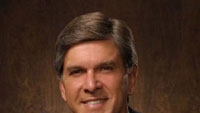NAB chief accuses subscription TV providers of 'hoarding spectrum'

NAB President Gordon Smith has accused the Dish Network and Time Warner Cable of “hoarding” spectrum while the FCC is pressuring broadcasters to give back 40 percent of their airwaves. The former Republican senator also recommended that the Government Accountability Office or some other independent agency conduct an investigation into “spectrum hoarding and/or spectrum speculation.”
Smith, making the charges in a letter to lawmakers who oversee broadcasting on Capitol Hill, cited a recent story in Communications Daily concerning Dish’s agreement to buy a bankrupt S-band licensee as well as remarks Dish CEO Charlie Ergen made last November during an earnings conference call.
In the call, the Dish chief called the 700MHz block of spectrum he bought in 2008 for $712 million a “pretty good inflation hedge … If we’re not able to strategically do something with the spectrum, there are probably other people who are able to do that.”
Smith wrote, “If America is truly facing a spectrum shortage, then it is imperative that policymakers receive an unbiased and thorough report on how private companies like Dish, Time Warner Cable and government agencies are using or warehousing this precious resource.”
Smith reiterated the NAB’s position on the FCC spectrum plan, saying that broadcasters do not object to being allowed to give back spectrum voluntarily.
“However, we will strongly oppose the forcible return of spectrum from broadcasters who choose not to ‘volunteer,’” Smith wrote. “In addition, we will oppose forced relocation of TV stations into bandwidth that would harm viewers’ ability to receive full high-definition TV, new niche programming choices via ‘multicasting’ and live and local digital television.”
In response to Smith’s letter, the National Cable & Telecommunications Association (NCTA) said that the allegations of spectrum hoarding by cable and satellite operators is “flat wrong.”
The professional video industry's #1 source for news, trends and product and tech information. Sign up below.
James Assey, NCTA executive vice president, said, “Instead of attempting to explain the role broadcasters can play in addressing these critical needs, NAB instead seeks to deflect attention from their spectrum holdings by advancing the baseless accusation that licensees which purchased spectrum at auction, and are in full compliance with the FCC’s requirements governing such frequencies, are engaged in the ‘warehousing’ and ‘hoarding’ of that spectrum.”
He said it was absurd for the NAB to imply that those who paid billions for their spectrum should be asked to give up that spectrum rather than require broadcasters to be more efficient. Assey called the NAB’s letter a “desperate attempt” to deflect the discussion from the responsibility of broadcasters to use their spectrum efficiently.
Gary Shapiro, president and CEO of the Consumer Electronics Association, said, “(The) NAB is seeking to confuse the U.S. Congress by comparing businesses that have paid large amounts for thin slices of spectrum with broadcasters who did not pay for broad swathes of the most desirable spectrum and who are sitting on underused spectrum loaned to them by government. The fast growth in wireless video requires that we repurpose underused spectrum.”
The FCC has asked broadcasters to give up 120MHz of spectrum for wireless broadband. The broadcasters are concerned that the effort might not be as voluntary as the FCC contends and worry that spectrum fees could be imposed on broadcasters who do not volunteer to give up bandwidth.
